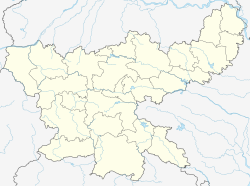Bharno block is a CD block that forms an administrative division in the Gumla subdivision of Gumla district, in the Indian state of Jharkhand.
Bishunpur block is a CD block that forms an administrative division in the Gumla subdivision of Gumla district, in the Indian state of Jharkhand.
Ghaghra block is a CD block that forms an administrative division in the Gumla subdivision of Gumla district, in the Indian state of Jharkhand.
Sisai block is a CD block that forms an administrative division in the Gumla subdivision of Gumla district, in the Indian state of Jharkhand.
Bero block is an administrative division in the Ranchi Sadar subdivision of Ranchi district, Jharkhand state, India.
Chanho block is a community development block in the Ranchi Sadar subdivision of Ranchi district in the Indian state of Jharkhand.
Mandar(mandar) is a community development block in the Ranchi Sadar subdivision of Ranchi district, in the Indian state of Jharkhand.
Ratu is a community development block in the Ranchi Sadar subdivision of Ranchi district, in the Indian state of Jharkhand. Ratu fort, located in Ratu, is a fort of Nagvanshi royal family.
Kuru block is a CD block that forms an administrative division in the Lohardaga subdivision of Lohardaga district, in the Indian state of Jharkhand.
Peshrar block is a CD block that forms an administrative division in the Lohardaga subdivision of Lohardaga district, in the Indian state of Jharkhand.
Bhandra block is a CD block that forms an administrative division in the Lohardaga subdivision of Lohardaga district, in the Indian state of Jharkhand.
Kisko block is a CD block that forms an administrative division in the Lohardaga subdivision of Lohardaga district, in the Indian state of Jharkhand.
Kairo block is a CD block that forms an administrative division in the Lohardaga subdivision of Lohardaga district, in the Indian state of Jharkhand.
Senha block is a CD block that forms an administrative division in the Lohardaga subdivision of Lohardaga district, in the Indian state of Jharkhand.
Nagri is a CD block that forms an administrtive division in the Ranchi Sadar subdivision of Ranchi district, in the Indian state of Jharkhand.
Peshrar is a village in the Peshrar CD block in the Lohardaga Sadar subdivision of the Lohardaga district in the Indian state of Jharkhand.
Itki is a community development block that forms an administrative division in the Ranchi Sadar subdivision of the Ranchi district, Jharkhand state, India.
Bhandra is a village in the Bhandra CD block in the Lohardaga Sadar subdivision of the Lohardaga district in the Indian state of Jharkhand.
Bagru is a village in the Kisko CD block in the Lohardaga Sadar subdivision of the Lohardaga district in the Indian state of Jharkhand.
Bishunpur is a village in the Bishunpur CD block in the Gumla subdivision of the Gumla district in the Indian state of Jharkhand.

